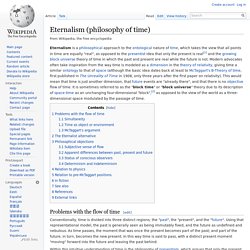

Eternalism (philosophy of time) Conventionally, time is divided into three distinct regions; the "past", the "present", and the "future".

Using that representational model, the past is generally seen as being immutably fixed, and the future as undefined and nebulous. As time passes, the moment that was once the present becomes part of the past; and part of the future, in turn, becomes the new present. In this way time is said to pass, with a distinct present moment "moving" forward into the future and leaving the past behind.
This conventional model presents a number of difficult philosophical problems, and seems difficult to reconcile with currently accepted scientific theories such as the theory of relativity. Many philosophers have argued that relativity implies eternalism.[3] Although he disagrees in a qualified sense, philosopher of science, Dean Rickles, notes that "the consensus among philosophers seems to be that special and general relativity are incompatible with presentism The philosopher Katherin A.
Notes. Existentialism. Existentialism is a term applied to the work of certain late 19th- and 20th-century philosophers who, despite profound doctrinal differences,[1][2][3] shared the belief that philosophical thinking begins with the human subject—not merely the thinking subject, but the acting, feeling, living human individual.[4] In existentialism, the individual's starting point is characterized by what has been called "the existential attitude", or a sense of disorientation and confusion in the face of an apparently meaningless or absurd world.[5] Many existentialists have also regarded traditional systematic or academic philosophies, in both style and content, as too abstract and remote from concrete human experience.[6][7] Definitional issues and background[edit] There has never been general agreement on the definition of existentialism.

The term is often seen as an historical convenience as it was first applied to many philosophers in hindsight, long after they had died. Concepts[edit] Solipsism. Solipsism ( i/ˈsɒlɨpsɪzəm/; from Latin solus, meaning "alone", and ipse, meaning "self")[1] is the philosophical idea that only one's own mind is sure to exist.

As an epistemological position, solipsism holds that knowledge of anything outside one's own mind is unsure; the external world and other minds cannot be known and might not exist outside the mind. As a metaphysical position, solipsism goes further to the conclusion that the world and other minds do not exist. Varieties[edit] There are varying degrees of solipsism that parallel the varying degrees of serious skepticism. [edit] Epistemological solipsism[edit] Epistemological solipsism is the variety of idealism according to which only the directly accessible mental contents of the solipsistic philosopher can be known. Methodological solipsism[edit] Methodological solipsism may be a sort of weak agnostic (meaning "missing knowledge") solipsism.
Main points[edit] See also: Solipsism: Relation to other ideas (below) History[edit] Possibilianism. Not to be confused with Possibilism.

Possibilianism is a philosophy which rejects both the diverse claims of traditional theism and the positions of certainty in strong atheism in favor of a middle, exploratory ground.[1][2][3][4][5] The term was first defined by neuroscientist David Eagleman in relation to his book of fiction Sum: Forty Tales from the Afterlives.[6] Asked whether he was an atheist or a religious person on a National Public Radio interview in February 2009, he replied "I call myself a Possibilian: I'm open to...ideas that we don't have any way of testing right now. "[6] In a subsequent interview with the New York Times, Eagleman expanded on the definition: "Our ignorance of the cosmos is too vast to commit to atheism, and yet we know too much to commit to a particular religion. A third position, agnosticism, is often an uninteresting stance in which a person simply questions whether his traditional religious story (say, a man with a beard on a cloud) is true or not true.